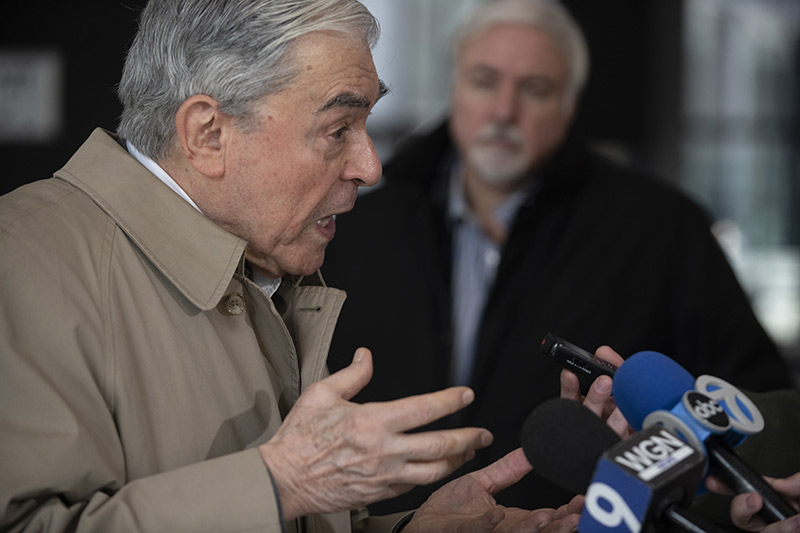By AARON GETTINGER
Staff Writer
DIRKSEN FEDERAL COURTHOUSE — Judge John Robert Blakey said today that he will decide on the defendants’ motion to dismiss the Protect Our Parks v. Chicago Park District lawsuit on Feb. 19.
Judge Blakey set another hearing date for Feb. 27 in the event issues remain within the lawsuit that is challenging plans to build the Obama Presidential Center in Jackson Park.
Blakey again expressed frustration with the slow progress of the lawsuit, and most of his back-and-forth with the attorneys was about discovery, the process through which the parties obtain evidence in the lawsuit.
After the attorneys argued over the merits of the motion to dismiss the case — the city and Park District argued that Protect Our Parks lacks standing — Blakey had them review the dozen pieces of evidence the plaintiffs are seeking. He decided that some were moot.
The plaintiffs and defendants will meet in the coming days to work out discovery. The judges timetable provided a much shorter window for discovery than the plaintiffs waned Should there be any disagreements after their discussions, the disagreements will be brought before the court, and Blakey will issue orders regarding the contested evidence.
Mark Roth, Protect Our Parks’ attorney, said in court that the University of Chicago had identified sites in Washington Park and Woodlawn as better than the Jackson Park site. Blakey, however, said that the bid had only identified pros and cons for each potential site on the South Side and not ranked them.
While Blakey originally set Feb. 26 as the next hearing date, should he not dismiss the lawsuit in its entirety, former Ald. Bob Fioretti (2nd), partner in the law firm representing the plaintiffs, requested a delay. Feb. 26 is Election Day, and Fioretti is running for mayor. The Feb. 27 hearing is scheduled for 10:30 a.m.
“I think it’s pretty much what we expected,” said Herb Caplan, Protect Our Parks’ president, after the hearing, adding that he suspects that the case will be decided on a summary judgment motion once discovery ends. “I think we’re on the right side, and I think the city has deliberately stalled and tried to come up with all kinds of schemes to avoid the ultimate conclusion.”
Louise McCurry, president of the Jackson Park Advisory Council who supports the OPC’s planned construction, was also happy that the case is moving forward. “Right now our children, who should be able to play sports in a new field and track, should be able to use a new gymnasium for indoor sports, to be able to use new running tracks, can’t do any of that because of the delays by the folks who’re filing lawsuits,” she said, referencing the plan to reconstruct the track and field used by Hyde Park Academy High School that currently occupies the planned OPC site.
Some have argued that Protect Our Parks is utilizing a strategy of attrition in the case similar to that which Friends of the Parks used to ultimately forestall construction of film director George Lucas’ art museum in Chicago.
Caplan said attrition is not his organization’s strategy. “We wanted some sort of fast, immediate action, because the city snuck in and cut down ancient trees when we weren’t looking.” He said it is the city’s strategy to delay the lawsuit in hopes that Protect Our Parks would run out of money, adding that the lawsuit now has financial backers in addition to himself and Charlotte Adelman, a suburban North Shore environmentalist.
“The lawsuit is entirely financed by voluntary contributions of ordinary citizens, and as long as people are that concerned, that take an interest in protecting Jackson Park, the lawsuit’s going to continue,” he said.
A spokesman for the Chicago Department of Law declined to comment after the hearing, citing the active litigation.
The Herald has requested comment from the Obama Foundation.







